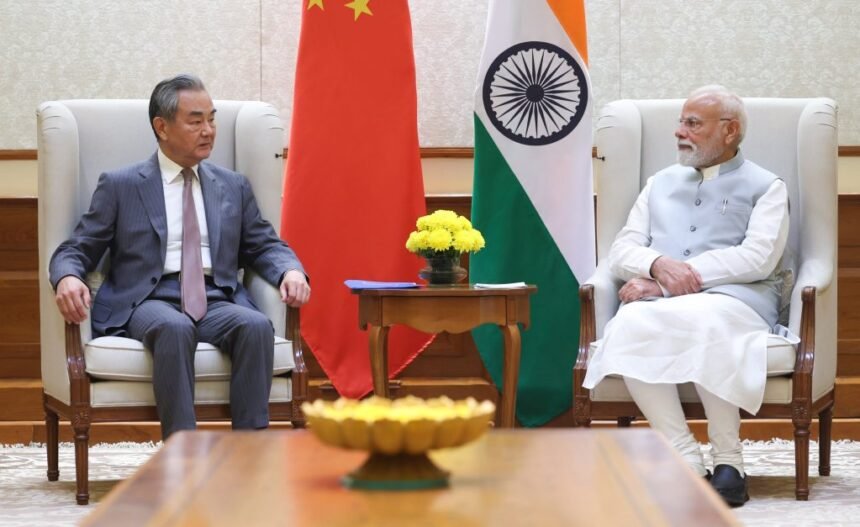Prime Minister Narendra Modi on Tuesday emphasised the importance of maintaining peace and tranquillity along the frontier with China and reiterated India’s commitment to a fair, reasonable, and mutually acceptable resolution to the boundary question during his meeting with Chinese Foreign Minister Wang Yi.
Modi said stable, predictable, and constructive ties between India and China would significantly contribute to both regional and global peace. He also expressed that he looked forward to meeting Chinese President Xi Jinping on the sidelines of the upcoming Shanghai Cooperation Organisation (SCO) Summit in Tianjin, China.
Wang, who arrived in Delhi on Monday for a two-day visit, conveyed a message and an invitation from President Xi to attend the summit. The development signals renewed momentum in India-China ties, even as relations between New Delhi and Washington remain strained over President Donald Trump’s tariff policies.
In a social media post after the meeting, Modi highlighted that India-China relations have made steady progress, guided by respect for each other’s interests and sensitivities, since his last interaction with President Xi around 10 months ago. Notably, two days after India and China agreed to end the eastern Ladakh standoff, Modi and Xi met in Kazan, Russia, in October last year and resolved to revive several mechanisms to normalise bilateral relations and address the boundary dispute.
Wang’s visit is being seen as part of ongoing efforts by the two neighbours to rebuild ties, which had been severely strained after the deadly Galwan Valley clashes in 2020.
“Glad to meet Foreign Minister Wang Yi. Since my meeting with President Xi in Kazan last year, India-China relations have made steady progress guided by respect for each other’s interests and sensitivities,” Modi posted on ‘X’. “I look forward to our next meeting in Tianjin on the sidelines of the SCO Summit. Stable, predictable, constructive ties between India and China will contribute significantly to regional as well as global peace and prosperity.”
The Prime Minister’s Office (PMO) said Modi stressed the need to maintain peace and tranquillity on the border and reaffirmed India’s commitment to a “fair, reasonable, and mutually acceptable” resolution of the boundary issue. He also welcomed the resumption of the Kailash Manasarovar Yatra and thanked Xi for the SCO summit invitation, which he accepted.
In a major thaw in relations, India and China on Tuesday unveiled a series of measures for a “stable, cooperative, and forward-looking” partnership. These include jointly maintaining peace along the frontier, reopening border trade, promoting investment flows, and resuming direct flight connectivity at the earliest.
The measures, aimed at unlocking the full development potential of both nations, were announced as India-US ties face turbulence over Washington’s trade and tariff policies.
India and China detailed the outcomes in a joint document following Wang’s meetings with External Affairs Minister S Jaishankar and National Security Advisor Ajit Doval. Both sides agreed to earnestly implement the important understandings reached between Modi and Xi and to promote sustained, sound, and steady growth of bilateral relations.
The Doval-Wang discussions under the Special Representatives framework produced five concrete outcomes, including the formation of an expert group under the Working Mechanism for Consultation and Coordination (WMCC) to explore an “early harvest in boundary delimitation,” according to the Ministry of External Affairs.
Both leaders agreed on the need to take a political perspective of the overall bilateral relationship while working towards a fair, reasonable, and mutually acceptable settlement of the boundary question, in line with the 2005 agreement on political parameters and guiding principles. (Agencies)









